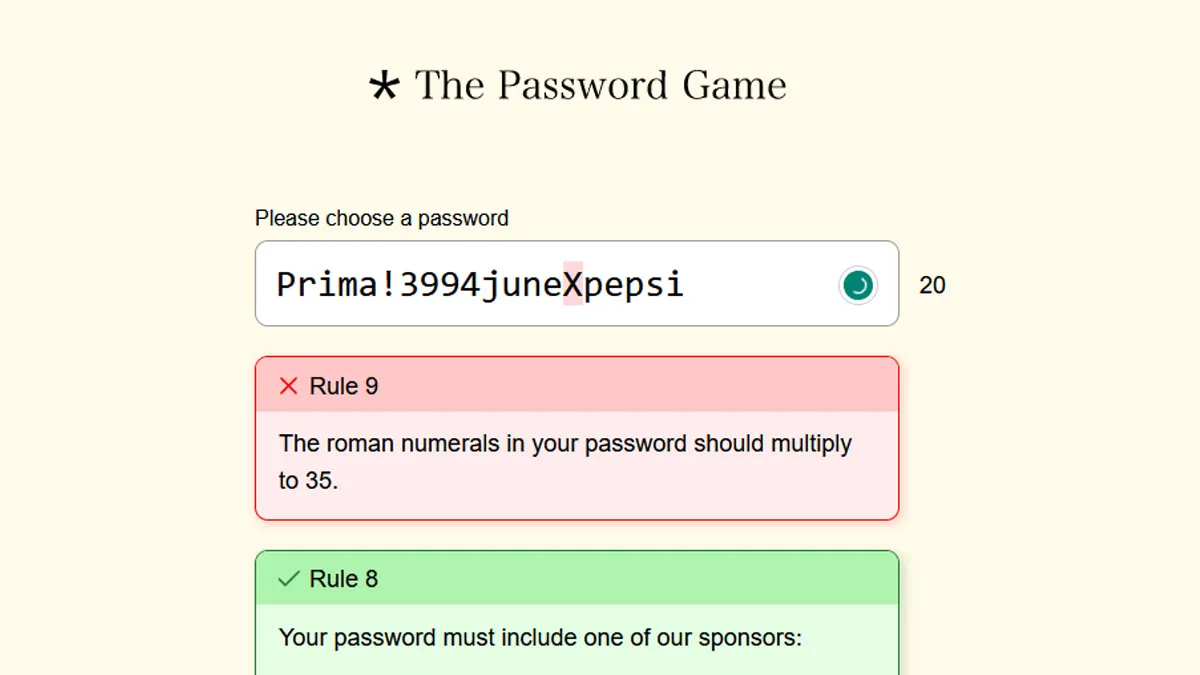Roman Numerals That Multiply To 35 Password Game
In the world of mathematics and ancient numeral systems, Roman numerals hold a unique place. They have been used for centuries and are still encountered in various aspects of our modern lives, from clock faces to book chapters. But have you ever thought about using Roman numerals in a fun and interactive way? In this article, we will explore a fascinating password game that involves Roman numerals and multiplication. So, grab your thinking cap and let’s dive into the world of “Roman Numerals That Multiply to 35.”
Roman numerals have been used for thousands of years, dating back to ancient Rome. They are a numeral system based on combinations of letters from the Latin alphabet, such as I, V, X, L, C, D, and M. These symbols represent values, and understanding how they work can be both educational and entertaining.
Understanding Roman Numerals
Before we delve into the game, let’s brush up on our Roman numeral knowledge:
- I represents 1
- V represents 5
- X represents 10
- L represents 50
- C represents 100
- D represents 500
- M represents 1000
Roman numerals are typically written largest to smallest from left to right. For example, 1994 is written as MCMXCIV, where M = 1000, CM = 900, XC = 90, and IV = 4.
The Multiplication Password Game
The “Roman Numerals That Multiply to 35” game is a brain-teaser that combines Roman numerals and multiplication. It challenges players to find pairs of Roman numerals whose product is equal to 35. Sounds simple, right? Well, it can be trickier than you think!
How to Play
- Create a list of Roman numerals (I, V, X, L, C, D, M) on a piece of paper or a digital device.
- Your goal is to find two Roman numerals from the list whose multiplication result equals 35.
- Use a calculator or mental math to perform the multiplication.
- Once you find a pair that works, write them down as your “password.”
For example, IV (4) multiplied by IX (9) equals 36, which is not the target number. Keep trying until you discover the correct combination!
Strategies for Success
To excel in this game, consider the following strategies:
- Start with simpler combinations, like I (1) and XXXV (35).
- Think outside the box and explore various Roman numeral pairings.
- Practice mental math to speed up the process.
- Challenge friends or family members to compete and see who can find the most combinations in a set time limit.
Educational Benefits
While this game is undoubtedly fun, it also offers several educational benefits:
- Improves multiplication skills.
- Enhances familiarity with Roman numerals.
- Encourages critical thinking and problem-solving.
- Makes learning math enjoyable for all ages.
Fun with Friends and Family
One of the best aspects of the “Roman Numerals That Multiply to 35” game is that it can be enjoyed with others. Gather your friends and family for a friendly competition and see who can crack the most Roman numeral passwords in a set time frame. It’s a fantastic way to bond while exercising your brain.
Variations of the Game
If you want to add some twists to the game, consider these variations:
- Set a time limit and see who can find the most passwords in that time.
- Create a point system based on the complexity of the Roman numeral pairs.
- Challenge each other to find pairs that multiply to different numbers, not just 35.
Ancient Roots and Modern Twist
This game combines the ancient numeral system of Rome with a modern twist. It’s a testament to the enduring appeal of Roman numerals and their ability to captivate our imagination even in the digital age.
Conclusion
“Roman Numerals That Multiply to 35” is not just a game; it’s a journey through history and mathematics. It challenges your mind, fosters learning, and provides endless entertainment. So, grab your Roman numerals list and start cracking those passwords!
FAQs
- Is it possible to find more than one pair of Roman numerals that multiply to 35?
Yes, there are multiple combinations that can result in a product of 35.
- Can I use larger Roman numerals like D (500) in the game?
Absolutely! Feel free to experiment with different combinations.
- Is this game suitable for children?
Yes, it’s a great educational game for kids to improve their multiplication skills.
- Are there other multiplication games involving Roman numerals?
While this game is unique, you can create your variations or challenges using Roman numerals.
- Where can I learn more about Roman numerals and their history?
You can find plenty of resources online or visit your local library for books on the subject.
